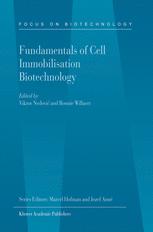

Most ebook files are in PDF format, so you can easily read them using various software such as Foxit Reader or directly on the Google Chrome browser.
Some ebook files are released by publishers in other formats such as .awz, .mobi, .epub, .fb2, etc. You may need to install specific software to read these formats on mobile/PC, such as Calibre.
Please read the tutorial at this link: https://ebookbell.com/faq
We offer FREE conversion to the popular formats you request; however, this may take some time. Therefore, right after payment, please email us, and we will try to provide the service as quickly as possible.
For some exceptional file formats or broken links (if any), please refrain from opening any disputes. Instead, email us first, and we will try to assist within a maximum of 6 hours.
EbookBell Team

4.3
28 reviewsCell Immobilisation Biotechnology Biotechnology is divided into two volumes. The first volume is dedicated to fundamental aspects of cell immobilisation while the second volume deals with the diverse applications of this technology.
The first volume, Fundamentals of Cell Immobilisation Biotechnology, comprises 26 chapters arranged into four parts: